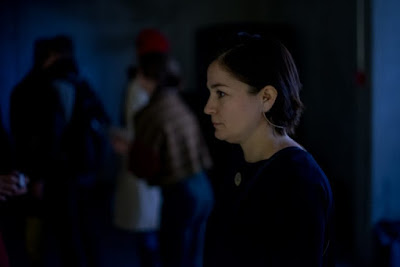Obscure Avenues was run twice on Saturday 8 April 2017, and I took part in the second performance Now, here I have to confess that I did not participate properly; I do not react well to being blind-folded so was permitted to attend as an observer. But talking to a couple of participants afterwards, they commented that it was one of the most though provoking events of the festival. Usually listening to live music is a communal experience, but here you felt completely alone. Taking part raised an enormous number of reactions and thoughts.
Watching the event, it was impressive the way the guides were able to help the blind-folded participants, showing them (generally in linked groups of five or six), where to go, when to descend steps. What was notable was the gentleness and quiet efficiently with which the guides made everything happen as the participants were taken on a complex journey.
First they were conducted round the post-industrial building where improvised live electronics were played on moving speakers, so nothing was constant. Additionally, a percussionist used an array of simple devices, stones, marbles, a bow, a drum, to 'play' the building so that when the groups were moving there was a constantly changing aural sound-track, some percussion, some electronic improvisation.
For the first concert of live electronics, the score had been created from the sounds of piano strings induced to resonate by magnetism. I only found this fact out afterwards, but it was clear that the electronic music had a distinct timbre and texture. Striking when sighted, it must have been more so when blind-folded.
A further journey took the participants to the final concert seated with live acoustic musicians. The piece was written specially for the performance, the composer knowing it was to be listened to blind-folded. I heard it blind in one way, I neither knew the title nor the composer. Written for violin, cello, prepared piano, percussion, clarinet (doubling bass clarinet) and flute, it opened with quiet music which took advantage of the array of types of sound that could be created by the instruments, prepared piano, strings playing pizzicato, arco, harmonics, sul ponticello. Yet the result was not pure texture, the composer's elegant, refined style shone through (when I learned by whom it was composed, I was not surprised). It flowed fluidly and stylishly, but the sense of refinement and sparseness also incorporated some lovely rich harmonies, so the result a lusciousness to it, building to a climax then gradually evaporating.
After this concert, the participants were led back to their bus and returned to the starting point, not knowing what they had heard or where they had had been. Though those who know Estonian contemporary classical music culture and Tallinn's music venues well, must have been able to make an educated guess.
 |
| Helena Tulve (Photo Rene Jakobson) |
Concept: Taavi Kerikmäe
Ensemble:
Tarmo Johannes (flutes)
Helena Tuuling (clarinets)
Merje Roomere (violin)
Levi-Danel Mägila (cello)
Taavi Kerikmäe (piano, electronics)
Vambola Krigul (percussion)
Le Quan Ninh (percussion, FR)
Tammo Sumera (electronics)
Thank you:
Riina Ausma, Mari-Liis Eskusson, Laura Kvelstein, Ruta Ronja Pakalne, Mari-Liis Pruul, Marie Pullerits, Tatjana Romanova, Ekaterina Soorsk, Silver Soorsk, Jaan Ulst, Maria Uppin
PROGRAMME
Improvisation
Performed by Le Quan Ninh (percussion), Taavi Kerikmäe (electronics)
Taavi Kerikmäe (b. 1976) Vibratings and Vibrations 2, a composition for 4-channel phonogram (2015)
Performed by Taavi Kerikmäe
Helena Tulve (b. 1972) The Heart of Land for piano and ensemble (2017, premiere)
Performed by the ensemble
Estonian Music Days in collaboration with Kultuurikatel and North Estonian Blind Society
Elsewhere on this blog:
- Contemporary classics & world premieres: Tallinn Spring: Estonian Philharmonic Chamber Choir at Estonian Music Days - concert review
- 25 years of Estonian contemporary music: Tallinn Spring: Estonian National Symphony Orchestra at Estonian Music Days - concert review
- A 55 year history: I talk to Kyung Wha Chung about Bach's solo violin sonatas and partitas - interview
- Naturalism and intensity: Tallinn Spring: Vox Clamantis at Estonian Music Days - concert review
- Strong line-up: Final of the Handel Singing Competition - concert review
- More please: The final volume of Monteverdi madrigals from Les Arts Florissants - CD review
- The real thing: Italian tenor Ivan Magri at Rosenblatt Recitals - concert review
- Reviving a rarity: New Sussex Opera in Delius' A Village Romeo and Juliet - opera review
- Engaging rarities: Handel's Alceste and Boyce's Solomon - concert review
- A glimpse of work in progress: The National Opera Studio at Rhinegold Live - concert review
- Home


.jpg)









No comments:
Post a Comment